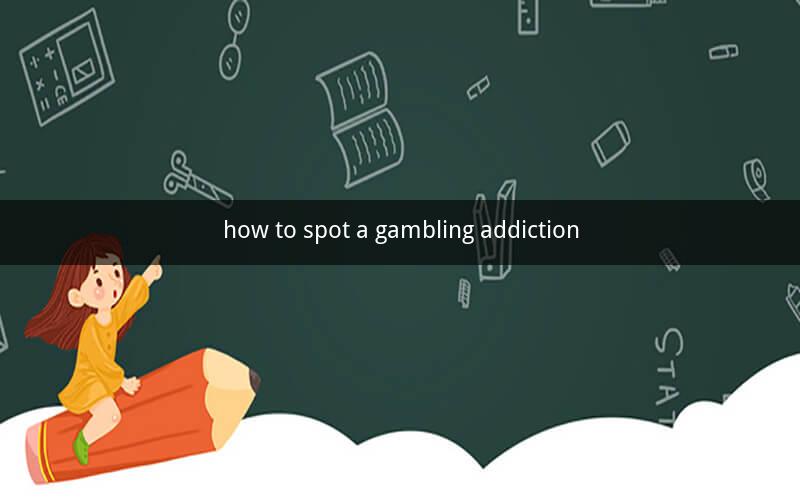
How to Spot a Gambling Addiction: A Comprehensive Guide
Table of Contents
1. Understanding Gambling Addiction
2. Signs of Problem Gambling
- Behavioral Indicators
- Financial Consequences
- Emotional and Psychological Symptoms
3. The Impact of Gambling Addiction
4. Identifying Risk Factors
5. The Role of Support Systems
6. Professional Help and Treatment Options
7. Prevention and Education
8. Case Studies: Real-Life Examples
9. Conclusion
1. Understanding Gambling Addiction
Gambling addiction, also known as compulsive gambling or problem gambling, is a serious condition characterized by an inability to control the urge to gamble, despite negative consequences. It is a form of addictive behavior that can affect individuals of all ages, backgrounds, and socioeconomic statuses.
2. Signs of Problem Gambling
Behavioral Indicators
- Increased time spent gambling
- Preoccupation with gambling, even when not engaged in the activity
- Attempting to stop or cut back without success
- Lying to family, friends, or therapists about gambling activities
- Using gambling as a way to escape problems or negative emotions
Financial Consequences
- Unpaid bills or loans
- Financial problems due to borrowing money to gamble
- Selling personal belongings to fund gambling
- Difficulty managing personal finances
Emotional and Psychological Symptoms
- Depression or mood swings
- Anxiety or irritability
- Guilt or remorse after gambling
- Withdrawal symptoms when not gambling
3. The Impact of Gambling Addiction
Gambling addiction can have devastating effects on an individual's life, including:
- Financial ruin
- Relationship problems
- Legal issues
- Health problems
- Suicidal thoughts or attempts
4. Identifying Risk Factors
Several factors can contribute to the development of a gambling addiction, including:
- Family history of addiction
- Mental health issues, such as depression or anxiety
- Trauma or stress
- Easy access to gambling opportunities
- Social influences, such as peer pressure or exposure to gambling
5. The Role of Support Systems
Support from family, friends, and professionals can be crucial in overcoming a gambling addiction. Support systems can provide emotional support, guidance, and resources for treatment.
6. Professional Help and Treatment Options
Professional help is essential for those struggling with gambling addiction. Treatment options may include:
- Therapy, such as cognitive-behavioral therapy (CBT)
- Support groups, such as Gamblers Anonymous
- Medication, in some cases
- Residential or outpatient treatment programs
7. Prevention and Education
Preventing gambling addiction involves education and awareness. Key strategies include:
- Promoting responsible gambling
- Limiting access to gambling venues
- Providing resources for those who may be at risk
- Raising awareness about the dangers of gambling addiction
8. Case Studies: Real-Life Examples
Case Study 1: John's Journey
John, a 45-year-old engineer, had been gambling for years without any issues. However, after a job loss, he turned to gambling as a way to cope with his stress. His addiction worsened, leading to financial ruin and strained relationships with his family. After seeking help, John attended therapy and joined a support group, eventually overcoming his addiction.
Case Study 2: Sarah's Struggle
Sarah, a 30-year-old teacher, developed a gambling addiction after a particularly difficult breakup. She spent countless hours and money on online slots, leading to financial and emotional turmoil. With the support of her friends and family, Sarah sought professional help and has since been able to manage her addiction.
9. Conclusion
Spotting a gambling addiction can be challenging, but recognizing the signs and seeking help is crucial. By understanding the signs, identifying risk factors, and accessing professional help, individuals can overcome their addiction and lead healthier, more fulfilling lives.
Questions and Answers
1. What are the primary signs of a gambling addiction?
- Behavioral indicators, financial consequences, and emotional/psychological symptoms.
2. Can anyone develop a gambling addiction?
- Yes, anyone can develop a gambling addiction, regardless of age, background, or socioeconomic status.
3. How can family and friends help someone with a gambling addiction?
- By providing emotional support, encouraging treatment, and seeking professional help.
4. What is the role of therapy in treating gambling addiction?
- Therapy, such as CBT, can help individuals develop healthier coping mechanisms and address underlying issues.
5. Are there any medications used to treat gambling addiction?
- Medication is used in some cases, but it is not the primary treatment method.
6. How can one prevent a gambling addiction?
- By promoting responsible gambling, limiting access to gambling venues, and raising awareness about the dangers of addiction.
7. What is the most effective treatment for gambling addiction?
- The most effective treatment varies for each individual, but a combination of therapy, support groups, and professional help is often recommended.
8. Can a gambling addiction be cured?
- While a gambling addiction cannot be cured, it can be managed and overcome with proper treatment and support.
9. Are there any support groups available for those with gambling addictions?
- Yes, Gamblers Anonymous and other support groups are available to provide support and resources.
10. How can one seek help for a gambling addiction?
- Individuals can seek help by contacting a therapist, joining a support group, or visiting a treatment center specializing in gambling addiction.